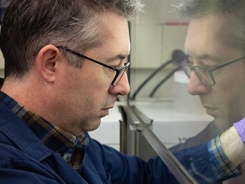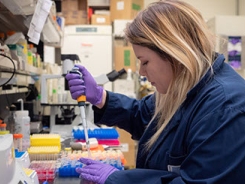THE PROBLEM
The RTK/RAS pathway is among the most commonly mutated pathways in cancer. Mutations in this pathway account for 75% of lung cancers, 80% of colon cancers, and 95% of pancreatic cancers, which are the top three causes of cancer deaths in the United States. The RAS family of genes (H-, N-, and KRAS) are the most commonly mutated oncogene, driving oncogenesis in 30% of human tumors. Tumors harboring RAS mutant tumors are resistant to conventional chemotherapeutic agents, so novel therapeutic strategies are needed to treat patients with RAS mutated tumors. Unfortunately, RAS mutant tumors are also resistant to therapies targeting signaling intermediates downstream of mutated RAS due to disruption of negative feedback mechanisms, and patients whose tumors harbor RAS mutations are excluded from receiving these treatments. Together, these difficulties indicate that novel approaches for treating mutant RAS-driven tumors are needed.
WHAT WE'RE DOING
The Kortum lab conducts pre-clinical studies designed to identify novel therapeutic targets for the treatment of RAS mutated tumors. Our primary focus is understanding how WT (non-mutated) RAS family members contribute to mutant-RAS driven cancer growth, and using this understanding to design novel therapeutic combinations that can inhibit the growth of RAS-mutated tumors. As a part of this research, we are also investigating how disruption of WT RAS activation can block the development of therapeutic resistance in EGFR-mutated lung cancers, with the goal of designing novel therapeutic regimens to prolong survival in these patients.
WHAT WE'VE DONE
We found that the RAS-activating protein (RasGEF) SOS2 is required for RTK-dependent WT RAS activation in RAS mutated tumors. Further, we found that combined inhibition of SOS2 and MEK (a major driver of proliferation downstream of mutated RAS) is a viable therapeutic strategy to treat KRAS mutated lung and pancreatic tumors (Sci Signaling, 2018).
Our work has been funded by the Congressionally Mandated Cancer Research Program (Lung Cancer Research Program) and Department of Defense (USU Foundation).


